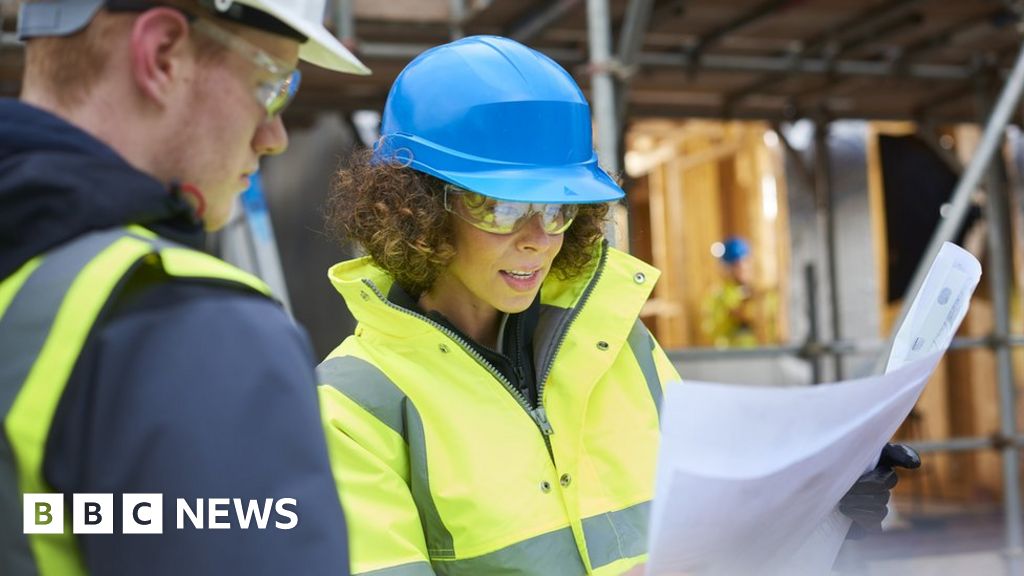- By John Campbell
- BBC News NI economics and business editor
Image source, Justin Paget
The delivery of major public infrastructure projects in Northern Ireland will cost almost £2.5bn more than planned, a spending watchdog has warned.
The Northern Ireland Audit Office (NIAO) analysed 77 projects across various Stormont departments.
They were originally estimated to cost £5.63bn but that has increased by 44% to £8.08bn.
Most of the additional cost relates to 11 major projects.
The auditor general, Dorinnia Carville, said some of the increased costs reflected “significant external factors”, including the impact of the Covid-19 pandemic and inflation.
However, she added that it was “extremely concerning” that, more than four years after her last report on this issue, there was little evidence of improvement or lessons learned being applied to new projects.
These include weaknesses in procurement and accountability.
The report looks at the executive’s seven “flagship” projects which were first identified in 2015.
- A5 road
- A6 road
- Belfast Rapid Transit (Glider)
- Belfast Transport Hub (Grand Central Station)
- Maternity and children’s hospital
- Regional and sub-regional stadia
- Fire Service Learning and Development Centre (formerly known as Desertcreat)
The Glider is the only one of the seven projects to be completed, although most of the A6 has been delivered. Grand Central Station and Desertcreat are in the latter stages of construction.
Ulster University, Strule Shared Education Campus, Lisburn and Newry primary care centres and the Belfast Critical Care Unit make up the 11 major projects.
‘Not achieving value for money’
Ms Carville said: “Even among the flagship projects, identified as the Northern Ireland Executive’s highest priority, progress has been very limited.
“It is clear that departments are not achieving value for money in the delivery of these major capital projects.”
Speaking to BBC News NI’s Good Morning Ulster on Tuesday, Ms Carville said the system remained in need of reform despite a number of previous reports recommending change.
“There have been many reviews in this area in the past and many recommendations but they are not being addressed quickly enough to see major improvement in this area.
“When you look at the level of cost overruns and think how that money could be spent elsewhere in our system it’s really imperative that we now take fundamental and immediate action to address these points”.
Ms Carville said the required reform must be driven by the Stormont Executive and, if adequately addressed, “we would be able to save money rather than incur cost overruns”.
The £2.5bn overrun, she added, is “money that could be spent elsewhere in the public sector on improving public services”.
‘Inefficient governance and delivery structures’
The NIAO last examined major infrastructure projects in 2019 with that work informing a report by Stormont’s Public Accounts Committee (PAC).
Some recommendations made by the PAC have been acted on, such as more regular scrutiny from the Northern Ireland Civil Service board.
However, the NIAO said “inefficient governance and delivery structures remain in place”.
It added that there are still concerns that the civil service lacks the skills and experience at the early stage of major projects when specifications, costings and timetables are being set.
Speaking on Good Morning Ulster on Tuesday, Mark Spence, chief executive of The Construction Employers Federation (CEF), said they were “not surprised” by the report’s findings.
Pointing to a “resource issue”, he said a lot of the most experienced people were lost through a large voluntary exit scheme in the public sector in recent years.
“Sometime projects have gone to the market with not robust enough specification of a project, which leads to vagueness and those things can lead to problems much later in the process,” Mr Spence said.
The NIAO report highlights the Southern Regional College campus in Armagh as an example of best practice for infrastructure delivery.
That project, which involved building a new college, came in on time and slightly under budget.
Some of the good practice highlighted included early engagement with the Strategic Investment Board, strong project governance and the effective use of collaborative digital tools.

